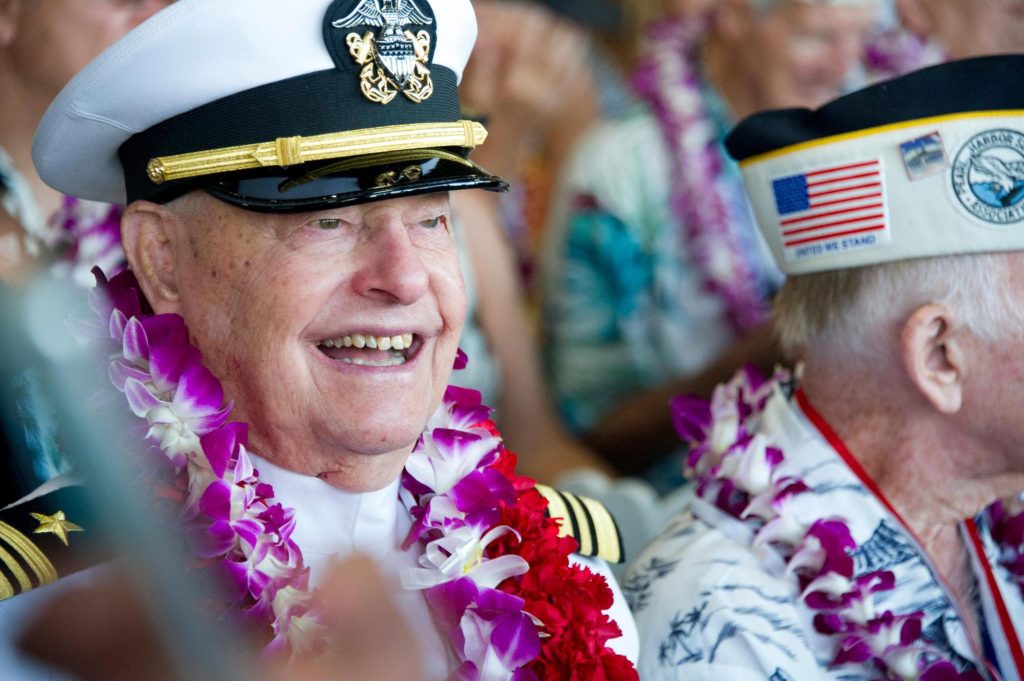By AUDREY McAVOY (Associated Press)
HONOLULU (AP) — The last remaining survivor of the USS Arizona battleship, which exploded and sank during the Japanese attack on Pearl Harbor, has passed on. Lou Conter was 102.
Conter died at his residence in Grass Valley, California on Monday due to congestive heart failure, according to his daughter, Louann Daley.
During the 1941 attack, the Arizona lost 1,177 sailors and Marines, accounting for nearly half of the total casualties that occurred during the surprise attack, which propelled the United States into World War II.
Conter, a quartermaster, was standing on the main deck of the Arizona when Japanese planes flew overhead at 7:55 a.m. on Dec. 7 of that year, as sailors were beginning to hoist colors or raise the flag when the assault commenced.
Conter remembered how a bomb pierced the steel decks 13 minutes into the battle, igniting over 1 million pounds (450,000 kilograms) of gunpowder stored below.
The explosion caused the battleship to rise 30 to 40 feet (9 to 12 meters) out of the water, as stated during a 2008 oral history interview housed at the Library of Congress. He described how everything was ablaze from the mainmast forward.
Conter said, “Guys were fleeing from the fire and attempting to leap over the sides. Oil on the sea was burning.”
In his autobiography “The Lou Conter Story,” he recounted how he and other survivors cared for the wounded, many of whom were blinded and badly burned. The sailors only abandoned ship when their senior surviving officer was certain they had rescued all those still alive.
The decaying remains of the Arizona still rest in the waters where it sank, with over 900 sailors and Marines still entombed inside.
Following Pearl Harbor, Conter attended flight school and obtained his wings to pilot PBY patrol bombers, which the Navy used for locating submarines and bombing enemy targets. He completed 200 combat missions in the Pacific with a squadron called the “Black Cats,” which conducted nighttime dive bombing in black-painted planes.
In 1943, he and his crew were shot down in waters near New Guinea and had to evade a dozen sharks. A sailor expressed doubt about their survival, to which Conter responded, “nonsense.”
“Never panic in any situation. Surviving is the first thing you tell them. Don’t panic or you’ll perish,” he stated. They remained calm and treaded water until another plane arrived hours later and lowered a lifeboat for them.
In the late 1950s, he became the Navy’s inaugural SERE officer, focusing on survival, evasion, resistance, and escape. Over the next decade, he trained Navy pilots and crew on jungle survival and how to endure as prisoners of war if captured. Some of his pupils utilized his teachings as POWs in Vietnam.
Conter concluded his 28-year Navy career in 1967.
Conter was born in Ojibwa, Wisconsin, on Sept. 13, 1921. His family later relocated to Colorado, where he walked five miles (eight kilometers) to school outside Denver. His home lacked running water, so he tried out for the football team — not out of a passion for the sport, but more for the opportunity to shower at school after practice.
He joined the Navy after he became 18, receiving $17 per month and a hammock for his bed at boot camp.
In his later years, Conter regularly attended annual remembrance events in Pearl Harbor that were jointly organized by the Navy and the National Park Service to honor the 1941 attack. When he was too weak to go in person, he made video messages for those who gathered and watched from afar at his home in California.
In 2019, at the age of 98, he mentioned that he enjoyed attending to honor those who had died.
He expressed, “It’s always important to return and show respect to them and give them the highest honors they deserve,”.
Despite being seen as heroes by many, Conter did not accept that label for the diminishing group of Pearl Harbor survivors.
Conter told The Associated Press in a 2022 interview at his California home, “The 2,403 men that died are the heroes. And we’ve got to honor them ahead of everybody else. And I’ve said that every time, and I think it should be emphasized.”









